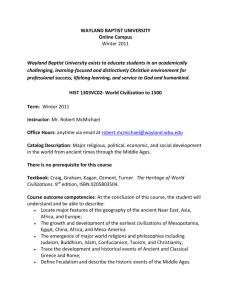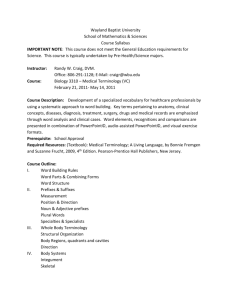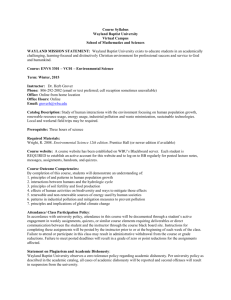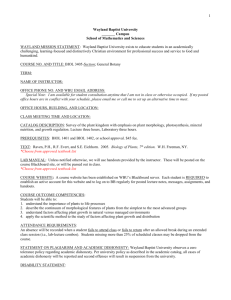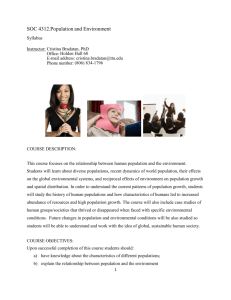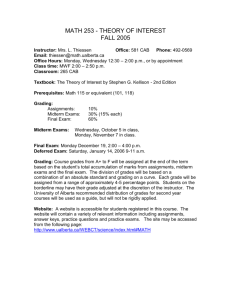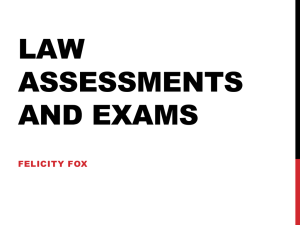ENVS 3401 - Wayland Baptist University
advertisement
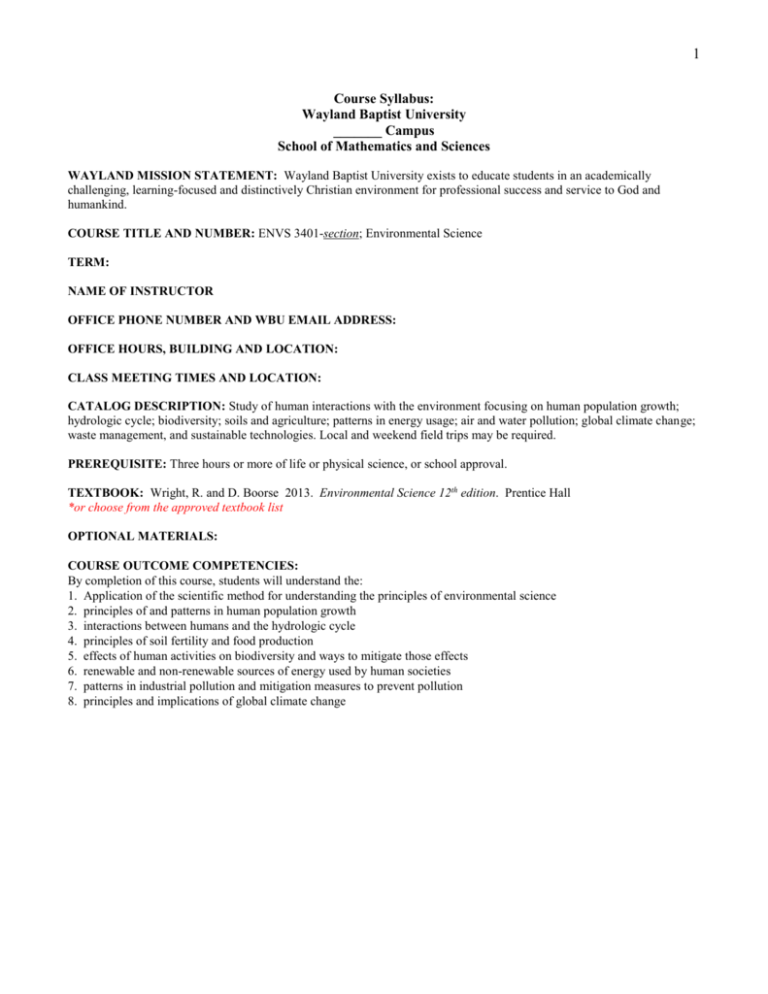
1 Course Syllabus: Wayland Baptist University _______ Campus School of Mathematics and Sciences WAYLAND MISSION STATEMENT: Wayland Baptist University exists to educate students in an academically challenging, learning-focused and distinctively Christian environment for professional success and service to God and humankind. COURSE TITLE AND NUMBER: ENVS 3401-section; Environmental Science TERM: NAME OF INSTRUCTOR OFFICE PHONE NUMBER AND WBU EMAIL ADDRESS: OFFICE HOURS, BUILDING AND LOCATION: CLASS MEETING TIMES AND LOCATION: CATALOG DESCRIPTION: Study of human interactions with the environment focusing on human population growth; hydrologic cycle; biodiversity; soils and agriculture; patterns in energy usage; air and water pollution; global climate change; waste management, and sustainable technologies. Local and weekend field trips may be required. PREREQUISITE: Three hours or more of life or physical science, or school approval. TEXTBOOK: Wright, R. and D. Boorse 2013. Environmental Science 12th edition. Prentice Hall *or choose from the approved textbook list OPTIONAL MATERIALS: COURSE OUTCOME COMPETENCIES: By completion of this course, students will understand the: 1. Application of the scientific method for understanding the principles of environmental science 2. principles of and patterns in human population growth 3. interactions between humans and the hydrologic cycle 4. principles of soil fertility and food production 5. effects of human activities on biodiversity and ways to mitigate those effects 6. renewable and non-renewable sources of energy used by human societies 7. patterns in industrial pollution and mitigation measures to prevent pollution 8. principles and implications of global climate change 2 ATTENDANCE REQUIREMENTS: An absence will be recorded when a student fails to attend class or fails to return after an allowed break during an extended class session. Students missing more than 25% of scheduled classes for any reason may be assigned a failing grade for the course. The instructor is NOT obligated to allow students to make up assignments given on dates when a student has an unexcused absence, or to accept assignments handed in late because of an unexcused absence. Students are advised to inform the instructor of ANY planned absence and to contact the instructor as soon as possible regarding an unplanned absence. STATEMENT ON PLAGIARISM AND ACADEMIC DISHONESTY: Wayland Baptist University observes a zero tolerance policy regarding academic dishonesty. Per university policy as described in the academic catalog, all cases of academic dishonesty will be reported and second offenses will result in suspension from the university. DISABILITY STATEMENT: In compliance with the Americans with Disabilities Act of 1990 (ADA), it is the policy of Wayland Baptist University that no otherwise qualified person with a disability be excluded from participation in, be denied the benefits of, or be subject to discrimination under any educational program or activity in the university. The Coordinator of Counseling Services serves as the coordinator of students with a disability and should be contacted concerning accommodation requests at (806) 2913765. Documentation of a disability must accompany any request for accommodations. Students should inform the instructor of existing disabilities the first class meeting. COURSE REQUIREMENTS AND GRADING CRITERIA: Students will be evaluated by in-class examinations, written and oral assignments, and class participation, which may include participation in field trips. Students are expected to take lecture notes, read assigned readings; complete all assignments posted on black board or given out during class; come prepared to discuss topic material in class, and attend and actively participate in all field activities. GRADING: Your course grade will be determined based on the number of points you earn on lecture exams; assigned papers; weekly “Making It Personal” assignments; and through class participation, as described below. NOTE THAT IN ACCORDANCE WITH UNIVERSITY POLICY, STUDENTS ARE NOT PERMITTED TO ASK FOR, NOR CAN BE GIVEN THE FINAL EXAM FOR A COURSE PRIOR TO THE PUBLISHED DATE. THE ONLY EXCEPTIONS ARE MADE FOR GRADUATING SENIORS. Lecture Exams: Lecture exam grades will be based on performance on exams, quizzes, or other written assignments and will be worth 60% of your final grade. There will be up to 4 lecture exams during the semester. Lecture exams will consist of a combination of multiple choice, T/F, matching, short answer and essay questions as appropriate for the material. Grades on chapter-level quizzes will be combined to contribute 50 points to your overall exam grade. Makeup exams will be available only under the most extenuating of circumstances. If a makeup exam is permitted, it must be taken within 24 hours of the in-class exam or by a pre-arranged date. All other makeup exams will be given at the time of the final exam. Bonus points on in-class exams will NOT be offered on makeup exams. Makeup exams may be of a different format with a greater emphasis on written questions and fewer alternative questions. Laboratory and Assignment Grades: Participation in labs and performance on laboratory exams, quizzes, and written assignments will account for 30% of your course grade. Some labs will require lab reports requiring data analysis and interpretation. Team or class projects will also apply to your laboratory grade. Specific instructions for lab assignments will be distributed at the time they are assigned. Assignments (e.g., Making It Personal Assignments - MIPs) may require students to read and respond to assigned readings; view and discuss videos; report on visits to local state parks, municipal facilities (e.g., waste water treatment plant or landfill) or other facilities as appropriate for the assignment; or prepare a research paper. Class Participation: Class participation will contribute 10% to your final grade. This grade may be based on exercises posted on BB, reflective essays or similar assignments, and on attendance and participation in in-class discussions or on-line discussion board or blogging activities and other assignments as appropriate. 3 Final Grades: Final grades will be assigned on the basis of the proportion of points earned from lecture and laboratory exams, etc., out of the total number of points possible. As stated earlier, points from lecture exams will be weighted to account for 60% of your final grade; lab points for 30%; and class participation for 10%. Final letter grades will be assigned as follows: A = 90-100%; B = 80-89%; C = 70-79%; D = 60-69%; and F = 59% or less. Students shall have protection through orderly procedures against prejudices or capricious academic evaluation. A student who believes that he or she has not been held to realistic academic standards, just evaluation procedures, or appropriate grading, may appeal the final grade given in the course by using the student grade appeal process described in the Academic Catalog. Appeals may not be made for advanced placement examinations or course bypass examinations. Appeals are limited to the final course grade, which may be upheld, raised, or lowered at any stage of the appeal process. Any recommendation to lower a course grade must be submitted through the Executive Vice President/Provost to the Faculty Assembly Grade Appeals Committee for review and approval. The Faculty Assembly Grade Appeals Committee may instruct that the course grade be upheld, raised, or lowered to a more proper evaluation. TENTATIVE CLASS SCHEDULE: The attached class schedule is subject to modification by the instructor. Actual exam dates may change. These changes will be announced in class to give students sufficient opportunity to adjust their schedules accordingly. For topics that cannot be completely covered in a scheduled class period, recorded lecture notes may be made available through Black Board to complete the material. Date 15-Jan ENVS 3401 - Environmental Science Tentative Lecture Schedule* Lecture Topic Intro; Public Policy Issues Reading 1&2 LAB TOPIC 20-Jan 22-Jan Intro; Public Policy Issues 27-Jan 29-Jan Human Pop Growth Human Pop Growth 8 8 Ecological Footprint 3-Feb 5-Feb Population & Development Population & Development 9 9 Project Lab 10-Feb 12-Feb EXAM 1 Water & Soil 10 & 11 17-Feb 19-Feb Water & Soil Food & Pests 10 & 11 12 & 13 Ecology Lab 24-Feb 26-Feb Food & Pests EXAM 2 12 & 13 Ecology Lab 3-Mar 5-Mar Energy - Fossil Fuels & Nuclear Energy - Fossil Fuels & Nuclear 14 & 15 15 & 15 LAB EXAM 1 10-Mar 12-Mar 17-Mar NO CLASS - MLK 1&2 Population Growth SPRING BREAK SPRING BREAK Energy - Renewable 16 FIELD TRIP - Wind Power 4 19-Mar Energy - Renewable 17 24-Mar 26-Mar Human Health & Environment Human Health & Environment 17 18 FIELD TRIP - Solar Power 31-Mar 2-Apr NO CLASS - EASTER BREAK EXAM 3 7-Apr 9-Apr Global Climate Change, Air & Water Pollution Global Climate Change, Air & Water Pollution 18, 19 & 20 18, 19 & 21 FIELD TRIP - CAPROCK 14-Apr 16-Apr Global Climate Change, Air & Water Pollution Global Climate Change, Air & Water Pollution 18, 19 & 21 18, 19 & 22 FIELD TRIP - Playas 21-Apr Solid Waste 21 & 22 Water & Solid Waste Management 23-Apr Solid Waste 22 & 22 28-Apr 30-Apr Stewardship & Sustainability Stewardship & Sustainability 23 24 5-May FINAL EXAM - MONDAY - 10:15-12:15 LAB EXAM 2 * NOTE 1: Lecture schedules are subject to change Changes in schedules will be announced in class and/or posted on Blackboard. **NOTE 2: Reading assignments may include portions of certain chapters. See study guide or announcements for specific reading assignments. ADDITIONAL INFORMATION: COURSE COMMUNICATION POLICY: Wayland email is the official method of communication between instructors and students taking courses through Wayland Baptist University. Students are REQUIRED to establish and activate their Wayland email account. Instructors reserve the right to deny email from other sources. CELL PHONES, PDAs, and OTHER CLASSROOM TECHNOLOGIES: Note that the following policies will be enforced. Repeat offenses may result in point reductions in class participation or assignment grades. TEXTING OR RECEIVING CALLS DURING CLASS IS STRICTLY PROHIBITED! Students are required to silence all cell phones and other paging devices at the start of class. If you anticipate an emergency message by one of these means, please inform the professor of the need for immediate contact before class begins. Under appropriate circumstances, you may be allowed to leave the device turned on during class, with the understanding that you will leave the room quietly if a call is received. NO CELL PHONES, PDAs, or MP3-type DEVICES ALLOWED DURING EXAMS – If you are observed with one of these devices during an exam you will receive a grade of zero for that exam. Use of personal computers during class is allowed for note-taking only. Surfing the internet or working on non-class related projects during class is strictly prohibited. IPODS and other listening devices must be turned off before class begins. Revised 03/18/15
